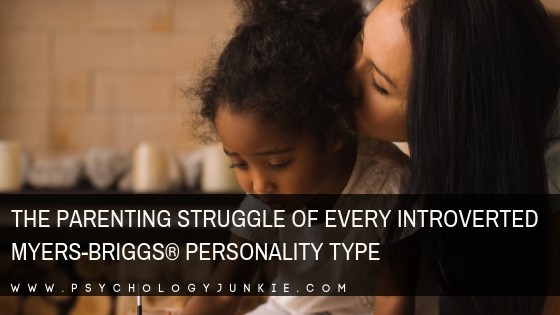The Parenting Struggle of Every Introverted Myers-Briggs® Personality Type
Have you ever felt alone in your struggles as a parent? Raising children is confusing, challenging, yet ultimately rewarding work. Your unique personality type has an influence in the struggles you face and the challenges you specifically have to overcome. Take a look at the unique frustrations that every introverted personality type deals with in the world of parenting.
Not sure what your personality type is? Take our new personality questionnaire!

Table of contents
Estimated reading time: 13 minutes
The Parenting Struggle of Every Introverted Myers-Briggs® Personality Type
The INFP Parent
Being an INFP parent means you don’t believe in forced cookie-cutter roles, mindless drills, or saying “you must do it this way.” You see your child as an original painting, not a sketch to be traced over and over. You’re here to protect that spark of individuality, to build happy memories, and to be that one person who gets their feelings without making it about you.
The catch? The world around you doesn’t always work on INFP time. If your spouse or in-laws want your home to look like a catalog and your kids to act perfectly polite ALL the time, you’re probably going to want to run away to a forest cabin for some peace (I know I would). You can’t stand being pushed to choose between what feels right in your gut and what the rest of the world says is “normal.”
And while you take parenting seriously—like, seriously—you’re not always here for society’s priorities. You might think a quiet, one-on-one chat with your kid matters more than having the laundry folded perfectly. But try telling that to the person who’s freaking out over the mess.
Here’s what else can trip you up:
- Noise. All the noise.
- Zero alone time to recharge your soul.
- Outside demands you never signed up for.
- That nagging voice in your head wondering if you’re too soft on discipline.
- Clash of values at home—nothing like fighting about what’s “best” for your kids while you’re just trying to keep them alive.
- Mom-shaming from the peanut gallery.
What to do?
- Vent. Find someone who won’t side-eye your parenting style. You need to offload the weight sometimes—get it out, breathe easier.
- Steal your alone time. Whether it’s locking the bathroom door for five minutes or zoning out with cartoons playing in the background, don’t feel bad for needing it.
- Journal. One INFP said it best—take time to write out your thoughts and feelings. It helps you remember what you value, not what your neighbor’s mom group says you should value.
You’re not just making memories—you’re teaching your kids that authenticity matters more than perfect photo ops. Keep going.
Read This Next: 7 Things That INFPs Experience as Children
The INTP Parent
INTP parents are all about helping their children learn and be curious. But they also need a lot of time for themselves, too. They’re curious, flexible, and usually game to hear whatever wild theory their kid’s cooking up. They’re the parents who might let you turn the living room into a cardboard city if it means sparking your creativity.
They’re also the parents who just want a little peace and quiet to think. Because as much as they love their kids’ imaginations, constant questions about Minecraft dragons or snack choices can be…a lot. INTPs need long stretches of solitude and a house that doesn’t sound like a circus. Having to stop mid-thought to break up a squabble or answer a question for the hundredth time can feel like their brain’s running on dial-up.
Stuff that can wear them down:
- Being in charge of endless noise and chatter
- Having to break up their own thinking for other people’s demands
- Routines that feel like a straitjacket
- Enforcing rules when they’d rather everyone just figure things out for themselves
What helps?
- Carve out alone time. Don’t be shy—ask for help. Rope in family or find a babysitter you trust.
- Daily quiet time is your friend. Audiobooks, crayons, cartoons—whatever buys you some headspace. Don’t feel guilty for using it.
- Get up early. Yes, it’s rough, but that quiet hour before the house wakes up? Worth every bleary-eyed second.
Parenting as an INTP is like running an endless think tank with tiny humans who never let you finish a thought. But with enough quiet time and flexibility, you’ll keep that spark alive—yours and theirs.
Read This Next: The Unhealthy INTP
The INFJ Parent
INFJ parents are focused on facilitating their children’s dreams and infusing meaning and purpose into everyday life. They want each child to feel truly seen for who they truly are – not what society expects them to be. They’re the ones who carve out special one-on-one moments, actively listen, and keep a little candle of wonder burning in their kids’ hearts.
But they’re also the ones who burn themselves out trying to do it all perfectly. INFJ parents set sky-high standards for themselves, working overtime to make their ideal family life real. When conflicts bubble up, they can feel torn in every direction—seeing every side of the argument, but not always knowing how to bring the hammer down when it’s needed. And let’s be real: no parent’s perfect, but INFJs take every misstep to heart, beating themselves up and pushing themselves to do better. Sometimes they give so much of themselves that they start to vanish in the process.
Things that tend to trip them up:
- A house full of noise and constant interruptions
- Trying to build a solid routine (while wanting to stay spontaneous)
- Forgetting little details like laundry and hair-combing in the rush to handle bigger dreams
- Never getting enough quiet to feel whole again
- Letting outside demands chew up all their energy
What helps?
- Steal some solo time. Even your most extroverted kid needs to learn to play by themselves—it’s healthy for them, and absolutely necessary for you.
- Remind yourself: nobody’s perfect. Talk to a friend you trust. Parenting’s easier to handle when you know you’re not the only one fumbling the ball.
- Journal it out. At the end of the day, write down your highs and lows. It’ll help you track what’s working (and what’s not), and you’ll be amazed how much relief it brings.
You’re not just holding your kids together—you’re holding yourself together too. Give yourself the same compassion you offer your children.
Read This Next: 10 Signs of an Unhealthy INFJ
The INTJ Parent
INTJs are the quintessential “teaching” parents. They love nothing more than imparting knowINTJ parents are the ultimate mentors—teaching their kids how to think for themselves and see the big picture. They’re totally cool with their children asking weird questions or challenging the rules (as long as there’s some logic behind it). INTJs have a soft spot for rebellious thinking but balance it out with teaching respect and independence. They’re the ones who set up clear rules and show kids how today’s choices shape tomorrow’s future.
But for all their smarts, INTJ parents can get stuck trying to be superhuman. They’ll pour themselves into parenting, but they’re also driven to keep their own interests and visions alive—and it can feel like a tug-of-war. Especially for stay-at-home INTJs, not having a side project or creative outlet can feel like losing a part of their soul.
Other things that can trip them up:
- Losing that precious alone time they need to think and recharge
- Constant interruptions and noise that derail their focus
- Answering endless questions that feel…kind of pointless
- Pressure to be the “model mom/dad” (spoiler: they’re not here for it)
- Having to do mundane, repetitive chores all day instead of big, future-facing plans
What helps?
- Have your own project. Whether it’s writing, building, or scheming up your next big idea, you need something outside of parenting to keep your mind alive.
- Make alone time non-negotiable. It’s not selfish—it’s how you keep showing up as your best self. If you can’t get family to help, hire someone if you need to.
- Remember: you’re not weird—you’re rare. Most parents you meet might not get it, and that’s fine. You’re not broken for wanting to skip the playdate small talk. You’re showing your kids that being true to themselves matters way more than fitting in.
Keep your vision alive. Your kids will thank you for it—maybe not now, but one day.
Read This Next: 10 Things That Terrify INTJs
The ISFP Parent
ISFP parents are equal parts tender and practical. They’re hands-on, always there to show their kids how to turn a rough day into something beautiful. ISFPs are the kind of parents who teach by doing—singing lullabies, making nature crafts, and finding magic in the everyday. They’re all about nurturing authenticity and giving their kids the freedom to walk their own path.
But let’s be real: parenthood isn’t always a stroll through the forest. The endless routines and demands—teacher meetings, appointments, dishes, laundry—can feel like a factory assembly line when what you really want is to follow the moment. ISFPs hate being boxed in, and that’s exactly what parenting can feel like some days.
Other things that make them want to hide under the covers:
- No personal time or independence
- Endless noise and kid chaos
- Conflicts at home that feel like a punch to the gut
- Having to enforce rules (ugh)
- The slow-burn of burnout
What helps?
- Claim your alone time. It’s not selfish—it’s sanity. Even if it’s just sneaking in some reading while the kids play Legos or letting them listen to an audiobook, find ways to protect your peace.
- Enlist help if you can. Spouse, friend, family—get backup so you don’t lose yourself.
- Stay true to your own values. The world’s always shouting about what “good parenting” should look like. Tune it out. You’re raising your kids your way—authentic, present, and deeply human.
You’re here to help your kids see the beauty in each messy moment. Don’t forget to see it for yourself, too.
The ISTP Parent
ISTP parents teach their kids to think for themselves, trust their instincts, and figure out how to build the life they want. They’re all about self-sufficiency and real-world skills: how to fix what’s broken, navigate the unexpected, and make their own decisions. They’d rather let their kids stumble a little than hover over them like a helicopter with a bullhorn.
But as much as they love the independence thing, parenting can feel like one long meeting they didn’t sign up for. They hate being forced into endless to-do lists and emotional check-ins. And the day-to-day grind—homework, chores, dinner that’s never quite done—can feel like a chain around their neck.
Other things that trip them up:
- All the big feelings kids throw at them
- Dealing with totally irrational behavior (seriously, why are we crying over socks again?)
- Enforcing routines and schedules that feel like a straitjacket
- Never getting a moment alone to just think
What helps?
- Carve out your own time. You need it like air—time for your own hobbies, projects, or just space to tinker in peace. Ask for help or hire it in if you need to.
- Remember, you’re not the “stereotypical” parent—and that’s a strength. If you’re a mom who’d rather build a treehouse than bake cupcakes, own it. Your kids need to see that there’s more than one way to be a parent.
You’re not here to micromanage. You’re here to show your kids how to handle life on their own terms—by modeling exactly that.
Read This Next: 5 Reasons Why You’ll Need an ISTP During a Zombie Apocalypse
The ISFJ Parent
ISFJ parents tend to be steady, warm, and always a step ahead. They’re masters at creating a home that feels safe and predictable, with a routine that keeps everyone feeling secure. They’re down-to-earth, practical, and always ready to support their kids in discovering their own interests. They’re the ones who notice the little things and make sure no one ever feels left out.
But here’s the thing: parenting’s messy, and ISFJs feel it in their bones. They like having everything routine and calm, so when life with kids turns into a three-ring circus (which, let’s be real, is often), they can get overwhelmed. If they’re juggling kids, work, and everything else, they’ll feel like they’re being pulled apart like a stretchy toy. Burnout? It’s practically the ISFJ job hazard.
What tends to make them want to hide under the covers:
- Noise. So much noise.
- Trying to keep the peace while doling out discipline (ugh).
- Fighting about values with a partner who sees things differently.
- Taking on everyone else’s problems on top of their own.
- Feeling taken for granted or unappreciated.
What helps?
- Get backup. Friends, family, even a trusted babysitter—take them up on help so you can breathe.
- Teach your kids the magic of independent play. Give them Legos, Play-Doh, or a stack of books and let them build their own little world for a while.
- Say “no” when you’re stretched thin. It’s not selfish—it’s survival. You’re a person too, and your peace of mind matters.
You’re the glue holding everything together, but even glue needs time to set. Take it. You deserve it.
Read This Next: ISFJ Personality Profile – An In-Depth Look at “The Nurturer”
The ISTJ Parent
ISTJ parents are the bedrock of family life—responsible, steady, and rational. They’re all about structure, creating daily routines that keep everyone feeling safe and on track. These are the parents who make sure there’s always a clean towel, a meal plan, and a plan B. They’re practical, prepared, and great at teaching their kids the life skills they’ll actually need.
When I go to homeschool events with my kids, the ISTJ parents are always the ones who remember the first-aid kit, the bug bite treatment, the sunscreen, and extra water. They really put me to shame, to be honest.
But here’s the thing: ISTJs like things just so, and kids have a way of turning “just so” into “what even is happening right now.” They’re perfectionists by nature, so every time the daily schedule goes up in smoke, they feel like they’re failing at the one thing they should have nailed down: order. Parenting’s chaos can feel like a personal affront to their careful plans.
Other things that make them want to hide in a bunker:
- No alone time, no independence—just constant noise
- Schedules trashed by unpredictable kid drama
- The sheer exhaustion of trying to keep everything (and everyone) afloat
- Losing their laser focus in the middle of the daily grind
What helps?
- Remember: not every kid loves structure as much as you do. Some of them will push back—don’t take it personally. Try to build some flexibility into your week so everyone can breathe a little.
- Make time for you. There’s always more work to do, but you can’t do it all if you’re running on fumes. Get help where you can—spouse, friend, caregiver—so you can recharge.
- Cut out distractions. Turn off the phone, ditch the background noise, and let yourself have a moment of quiet. Push that stroller around the block if that’s what it takes.
You’re the rock in the storm, but even rocks need time to rest. Take it. You’ll be a better parent—and a happier human—because of it.
Read This Next: What ISTJs Do When They’re Really Stressed Out
What Are Your Thoughts?
Did you enjoy this article? Do you have any tips you’d like to share with other introverted parents? Let us know in the comments! Want to parent to your strengths and understand the personality type of your child? Get our parenting by personality course here!
Find out more about your personality type in our eBooks, Discovering You: Unlocking the Power of Personality Type, The INFJ – Understanding the Mystic, The INTJ – Understanding the Strategist, and The INFP – Understanding the Dreamer. You can also connect with me via Facebook, Instagram, or Twitter!










This seems very heavily geared toward women rather than both men and women.
Your INTJ profile like a glove. Thanks!
I find your articles so enlightening. Your description of an INFP childhood / adolescence experience was for me, “Spot on.” I can so keenly identify with feelings of being different from my peers & generally from societal expectations all of which seemed hum drum & uninteresting! I constantly questioned myself & most of the time blamed myself for being “out of step.” Thankfully, my mother was uncritical & accepting but, the journey was & continues to be challenging … at times.
However, your articles help me to fill in the missing pieces and enlarge my understanding of what makes me tick for which I am deeply grateful. Thank you! 😀